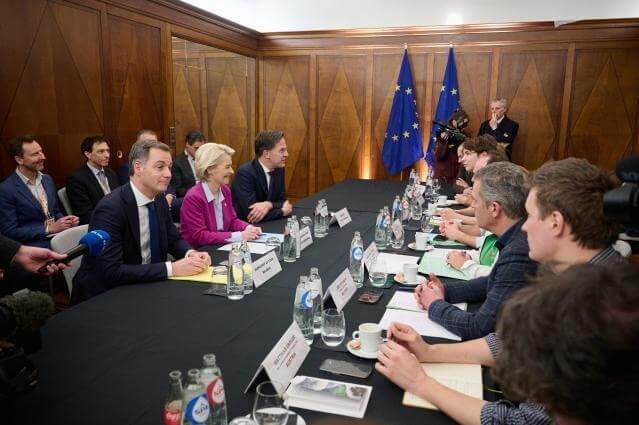Governments across Europe, including the EU administration in Brussels, have been giving in to the demands of angry farmers and easing measures that have brought tens of thousands to street blockades.
A whole series of administrative measures (national and at the EU level) are being eased rapidly to help food producers, who have been hit hard by the financial troubles over the past years.
The wave of concessions by European governments was followed by the flattering rhetoric of European politicians towards farmers, and their unusually rapid reaction to meet numerous protesters’' demands as soon as possible.
None of the European governments, including the outgoing EU administration, wants thousands of farmers with their tractors and trucks blocking the streets, highways, ports and border crossings just 4 months before the elections for the European Parliament.
The political risk of European governments in a conflict with farmers is insignificant if we consider that agriculture in the EU accounts for, on average, only about 4.5% of the total workforce. This is a relatively small number of voters. However, their dissatisfaction always gains broad public support and solidarity, which is a risk that none of the politicians wants to take a few months before significant elections.
Relief brought under pressure
Farmers' protests swept across Western Europe, and as if acting in sync, it has been difficult to find a direct connection between their organisers.
Most of the issues they face are similar, and the means of tackling them are in the same places - in national governments and the European Commission in Brussels.
Politicians act in sync while meeting the demands of the protest in the short term because they also have a shared motive to solve the crisis.
"Farmers play an essential role in Europe's economy and society" (Ursula von der Leyen)
“Farmers play an essential role in Europe's economy and society”, said Ursula von der Leyen, the President of the European Commission, using a condescending vocabulary that might have pleased the protesting farmers.
However, the decisions of Brussels to introduce tariffs on the import of the most sensitive products, such as eggs, sugar and poultry, if imports into the EU exceed the usual levels of the past 2 years certainly meant more to them.
They are also satisfied with the Commission's decision to release farmers from the obligation this year to maintain land fallow on a smaller part of their arable land (4%) and allow them to grow nitrogen-fixing crops, such as lentils or peas instead.
Putting out fires
Brussels' concession comes after a series of demands by European farmers, primarily those in the east, to limit food imports from Ukraine, which have threatened their production due to lower prices.
European farmers are at a loss not only because of the influx of large imports from outside the EU (Ukraine and Latin America) but also because of the closing of the Russian market for their products and the increase in input costs (fuel and taxes).
The new French Prime Minister, Gabriel Attal, has announced a whole set of relief measures for farmers, whose barricades have disrupted life in the country in recent weeks.
He promised to abandon the ban on certain pesticides as long as they were applied in other EU countries, which was one of the most significant demands of the farmers, asking for the same treatment as their colleagues throughout the EU.
The relief packages have been aimed at putting out fires
The government will allocate an additional €150 million in subsidies for meat production, reduce taxes on family farms, and set aside a package of €2 billion for loans to food producers.
The relief packages undertaken by some European governments and the EU administration have been aimed at putting out fires. They have a short-term effect and are calculated to convince farmers to stop their protests.
However, the whole complex of controversial and unfavourable issues for farmers still remains on the table. Most of them relate to implementing green transition, and often conflict with the interests of farmers.
Conflict over green policies
German farmers, for example, have been facing resistance because of their opposition to the government's policy of gradually phasing out diesel subsidies, given that their benefits are regarded as much smaller than the environmental benefits of reducing diesel use in agriculture.
Farmers have also been under attack from the demands resulting from green national policies to reduce fertilisers by 20%, livestock counts to reduce methane emissions (in the Netherlands, for example), and the usual increase in restrictions on the use of pesticides.
Rising input costs and liberalised imports from non-EU countries make European agricultural production less competitive.
 Do farmers want to be a partner of the climate transition?
Do farmers want to be a partner of the climate transition?
If they win in this wave, as far as part of the demands are concerned, farmers and governments will still have a long way to reconcile the interests that conflict at many points in implementing green policies.
Given that the decarbonisation and green transition policies have gained broad support from European voters, EU governments and the Union's administration will find it challenging to compromise with farmers in that area. It is unrealistic to expect a significant abandoning of green policies due to farmers' demands.
“Farmers want to be a partner of the climate transition, I have not seen any farmer that does not love nature - they live from nature”, said Alexander De Croo, Belgian Prime Minister. He spoke with his Dutch counterpart Mark Rutte and Ursula von der Leyen to delegations of farmers at the end of the EU summit last Thursday.
This is more an appeal and hope of the Belgian PM than a calculated political assessment that farmers will be faithful allies in implementing green transition. Farmers will find it difficult to accept policies that harm them, regardless of the fact that "they live from nature”. They will expect satisfactory compensation for adapting their production to the EU's green goals.